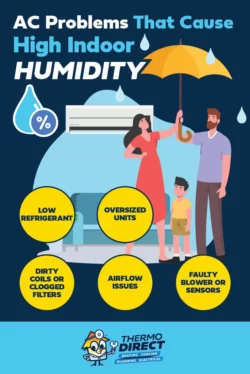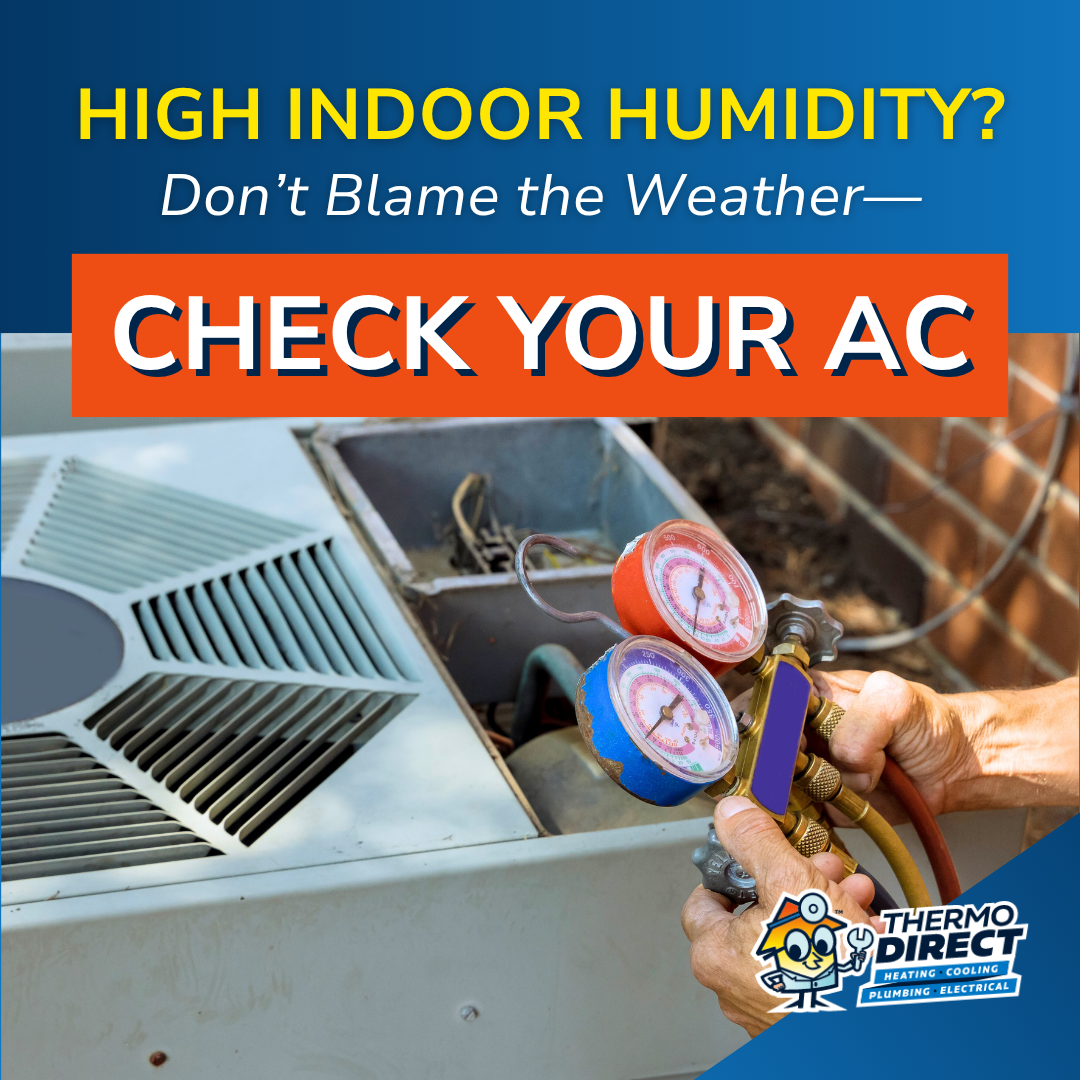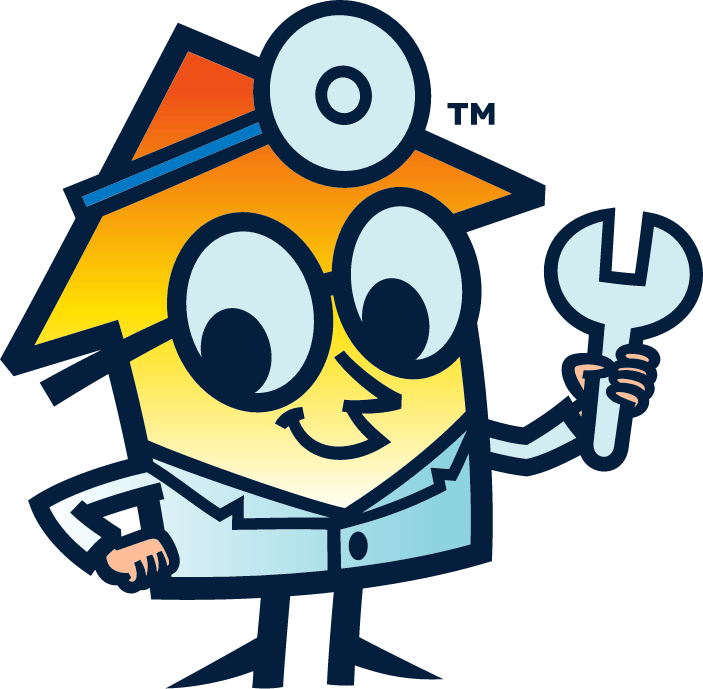Have you noticed areas of your home have high indoor humidity? Your air conditioner could be the culprit. Even though North Carolina is known for having a humid climate, your home shouldn’t be covered in condensate or smell like mildew, two common signs of high humidity and AC issues.
The professionals at Thermo Direct are here to help with your humidity and AC issues. Our service area spans several NC communities, including Raleigh, Chapel Hill, Cary, Garner, and Morrisville.
Trusted in Raleigh — Thermo Direct Solves the Problem at the Source
We’ll help you find the causes of high indoor humidity, repair your AC, and quickly restore your home comfort.
Why indoor humidity shouldn’t be ignored
High humidity levels in your home lead to discomfort, stuffiness, and damage caused by water leaks. It may also cause problems like:
- Mold and mildew growth.
- Damaged wood furniture.
- Moisture damage to walls and paint.
- Worsening respiratory symptoms and allergies (additional moisture in the air traps pollutants and allergens, increasing their concentration).
Understanding the Link Between Your AC and Humidity
If you’re asking yourself, “Why is my house so humid?” you may want to look into your air conditioner’s performance.
How air conditioners remove moisture from the air
Warm, humid air enters the air conditioner and passes over the cold evaporator coil.
Moisture from the air condenses as it cools, forming liquid on the coil. This condensate drips down into a drain pan and runs out through a drain.
Some signs your AC isn’t dehumidifying effectively include:
- Visible moisture on the windows or walls.
- Uncomfortable, stuffy air.
- Warm air from the vents.
- Ice forming inside the air conditioner.
If you’re experiencing higher-than-normal indoor humidity levels even when the AC is running, call Thermo Direct for help.
AC problems that cause high indoor humidity
Common issues that result in air conditioners not removing humidity include:
- Poor maintenance, such as dirty coils or clogged filters.

- Oversized air conditioning units causing short cycling.
- Low refrigerant levels.
- Improper AC airflow.
- Malfunctioning blower fans or sensors.
What To Do if Your AC Isn’t Controlling Humidity
If your AC isn’t reducing the humidity in your home, consider the following options.
Quick fixes homeowners can try
Some easy central AC high humidity fixes you can do yourself include:
- Changing the air filters.
- Adjusting the thermostat settings for longer cycles.
- Checking for blocked vents or closed air returns.
When it’s time to call a professional
Unless it’s a simple DIY fix listed above, it’s usually safer to call a professional HVAC technician when you need AC repair for high humidity. Your HVAC system is complex, with multiple components that work together to dehumidify and cool your home.
Some common signs it’s time to call an expert at Thermo Direct include:
- Persistent humidity in the home, even with clean filters.
- A lasting moldy or musty smell in the house.
- Condensation forming on the windows, mirrors, or walls.
- Ineffective or inconsistent cooling and drying.
- Rising energy bills when the AC is turned on.
- Poor home comfort.
How Thermo Direct Can Help You Breathe Easier
At Thermo Direct, we’ll help improve your indoor air quality with our comprehensive AC service options.
HVAC system inspections and diagnostics
We offer HVAC tune-up services, with AC performance checks that include looking at the airflow, refrigerant levels, and coils, along with cleaning and checking all parts of the HVAC and ductwork system. Using our maintenance checklist, we’ll systematically check all aspects of your air conditioner to find the cause of the additional humidity.
AC repairs that solve humidity issues
Common air conditioner repairs that solve humidity issues include:
- Coil and filter cleanings.
- Refrigerant recharges.
- Adjusting the fan speed.
- Blower motor repairs.
We also offer the option to upgrade to a smart thermostat, which provides better control over the humidity levels, even when you’re not at home.
Upgrade options for lasting humidity control
Along with smart thermostats, we can also upgrade your HVAC system with:
- Dehumidifier add-ons.
- Zoned or variable-speed HVAC systems.
- Energy-efficient AC replacements.
- An appropriately-sized air conditioner.
Our technicians will never try to upsell you on HVAC products you don’t need. We’ll give you our recommendations with accurate pricing when appropriate, so you can make an informed decision. Income-eligible North Carolina households may also qualify for rebates when upgrading to energy-efficient HVAC equipment.
Benefits of booking with Thermo Direct
Restore your comfort and improve your indoor air quality by scheduling service with Thermo Direct. A clean, well-maintained HVAC system can:
- Prevent future water damage and mold
- Boost your system’s efficiency
- Reduce utility costs
Whether we’re installing a new AC motor or changing a filter, we’ll treat you with the respect you deserve as a valued customer.
Family-owned, community-trusted HVAC experts
When you choose Thermo Direct, you’re supporting a local, family-owned Raleigh business that cares about our community. We have decades of experience in North Carolina homes, providing transparent pricing, honest diagnostics, emergency service, and flexible scheduling.
We offer financing options to qualifying customers, and coupons are available for additional savings.
Contact Thermo Direct for HVAC Services
If you’re dealing with high humidity in your home and think your air conditioner might be to blame, trust the team at Thermo Direct to provide reliable solutions. Contact us today to schedule a service and find out why our licensed technicians consistently earn 5-star ratings from North Carolina homeowners.
Frequently Asked Questions
What should indoor humidity levels be?
The US Environmental Protection Agency (EPA) recommends keeping home humidity between 30 and 55 percent. Other researchers recommend a slightly higher percentage of up to 55 percent, depending on your personal comfort levels and health concerns.
Can weather alone cause high indoor humidity?
Yes, it’s possible for the outdoor conditions to affect your indoor humidity levels, especially if your HVAC system isn’t keeping up or you have poor home ventilation. Upgrading to a more efficient HVAC helps keep moisture at bay.
Should I add a dehumidifier to my HVAC system?
North Carolinians may want to consider adding a dehumidifier, especially if moisture-related issues have been an ongoing problem. A whole-house dehumidifier extracts excess moisture, keeping your home drier and more comfortable.










